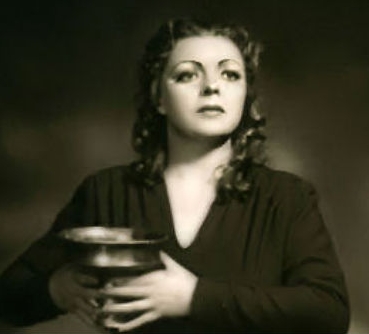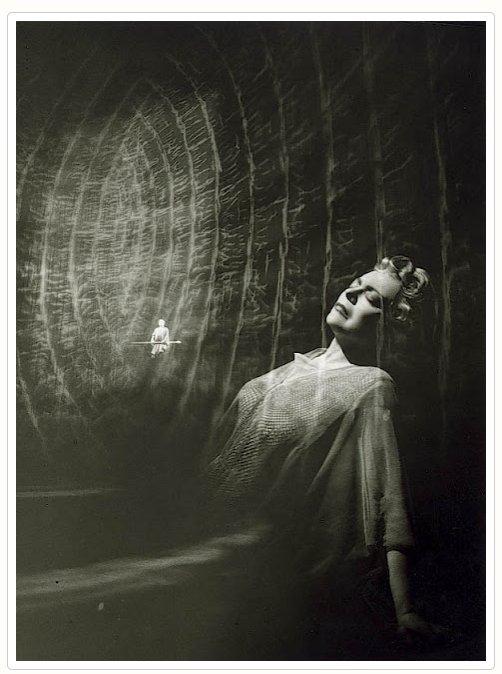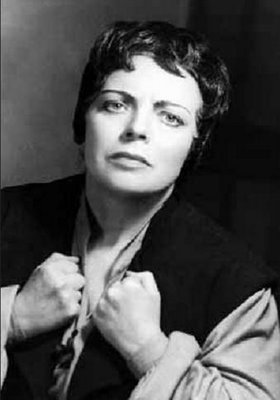

 MM: Each singer will adapt his vocal
production
accordingly. To sing Wagner at Bayreuth is the most beautiful,
but also the most difficult thing.
MM: Each singer will adapt his vocal
production
accordingly. To sing Wagner at Bayreuth is the most beautiful,
but also the most difficult thing. BD: Tell me about Fidelio. How is she different
from
Italian characters?
BD: Tell me about Fidelio. How is she different
from
Italian characters?|
Martha Mödl, 89, a Soprano Who Gave Her Life to Her Art By ANNE MIDGETTE Published in The New York Times, December 23, 2001 Martha Mödl, one of Germany's leading Wagnerian singers, died last Sunday in a hospital in Stuttgart. She was 89. Miss Mödl was known as much for her dramatic intensity as for her powerful, thrilling voice, which sometimes betrayed difficulties in the upper register. She began her career in mezzo-soprano roles and returned to them later in her career. This did not keep her from being a major Brünnhilde and a celebrated Isolde in her prime. ''This is a singer with temperament, an abundance of animal spirits and brains to boot,'' Harold C. Schonberg wrote in The New York Times in February 1957, during her debut season with the Metropolitan Opera. Miss Mödl, who was born in Nuremberg on March 12, 1912, had a relatively late start as a professional singer. She worked as a secretary until she was 28, and did not make her stage debut until 1942, when she sang Hänsel in Humperdinck's ''Hänsel und Gretel'' at the opera house in Remscheid. A short time later, her career had a temporary setback when she was conscripted to work in a munitions factory. After the war, in 1945, Miss Mödl performed at the opera house in Düsseldorf, where she took on such mezzo roles as Dorabella (''Così Fan Tutte''), Octavian (''Der Rosenkavalier'') and Carmen. The role of Marie in Berg's ''Wozzeck,'' which she first sang in 1947, opened the way to 20th-century opera, in which she was later to specialize, and was also her first excursion into soprano territory. Soprano roles proved to have a hold: in 1950, she took on Kundry (''Parsifal'') and Verdi's Lady Macbeth in Berlin. Isolde, Venus (''Tannhäuser'') and all three ''Ring'' Brünnhildes soon followed. Miss Mödl's international fame was secured through her association with Wieland Wagner, who invited her to sing Kundry at the reopening of the Bayreuth Festival in 1951. Epitomizing Mr. Wagner's vision of the ideal soprano for his new Bayreuth, she continued to appear there until 1967, in a range of roles. She noted that she was perhaps the only soprano to have appeared in all three female leads in ''Die Walküre'' at Bayreuth, having sung Brünnhilde, Sieglinde and, finally, Fricka. Miss Mödl took part in other significant postwar reopenings. In 1955 she sang Leonore in the ''Fidelio'' that opened the restored Vienna State Opera, which she later called ''one of the most memorable moments of my life.'' In 1963, at the opening of the rebuilt National Theater in Munich, she appeared in ''Die Frau Ohne Schatten'' in the role of the Nurse. Her Metropolitan Opera career was somewhat more circumscribed. She made her American debut at the house in the 1956-57 season in ''Siegfried'' and ''Götterdämmerung,'' added Isolde and Kundry in 1958, and returned in the ''Ring'' and ''Parsifal'' in the 1959-60 season. Her appearances, if few, were celebrated. Miss Mödl never retired. When she was compelled to leave her signature Wagner roles, she simply explored new repertory, appearing in contemporary works by Stravinsky (who conducted her in ''Oedipus Rex''), Hans Werner Henze (''Elegy for Young Lovers''), Aribert Reimann (''Melusine,'' ''Gespenstersonate'') and Wolfgang Fortner (''Elizabeth Tudor,'' ''Die Bluthochzeit''). She continued to appear onstage until the end of her life. Miss Mödl was one of the last exponents of the diva who gave her life to her art. Not that she necessarily embraced the role. ''I never had the talent to be a diva,'' she said in an interview, ''but I just like to sing and act so much.'' |
This interview was via letter early in 1986. This transcript was published in Wagner News in March, 1987, and portions (along with recordings) were read on WNIB in 1986. The transcript was posted on this website in 2012, and the photos, end credit and obituary were added at that time.
To see a full list (with links) of interviews which have been
transcribed and posted on this website, click here.
Award - winning broadcaster Bruce Duffie was with WNIB, Classical 97 in Chicago from 1975 until its final moment as a classical station in February of 2001. His interviews have also appeared in various magazines and journals since 1980, and he now continues his broadcast series on WNUR-FM, as well as on Contemporary Classical Internet Radio.
You are invited to visit his website for more information about his work, including selected transcripts of other interviews, plus a full list of his guests. He would also like to call your attention to the photos and information about his grandfather, who was a pioneer in the automotive field more than a century ago. You may also send him E-Mail with comments, questions and suggestions.